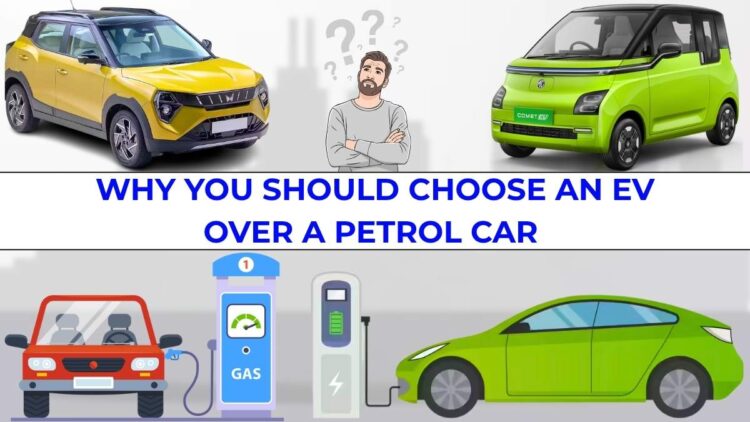As petrol cars are gradually being driven down over time, people are choosing to buy electric cars over petrol-powered vehicles. One reason for this is that governments around the world are promoting EVs.
The GOI has also come up with several schemes to promote electric vehicles, under which subsidies are given. In this article, we have discussed why you should buy an electric car instead of a petrol one.
Why should one consider an EV over a petrol car?
Electric vehicles have made significant inroads in India in the last few years. Currently, 5% of road traffic is electric, and the government plans to increase this to around 30% by 2030.
The purpose of electric vehicles instead of petrol is not only to prevent the environment from getting polluted but also to be beneficial for an owner in different terms.
Cheap to run, easy to maintain
The advantage of electric cars is that they travel more at a lower cost. While a petrol car costs approximately 6 to 8 rupees per kilometer, for an electric car it costs only between 1 and 1.5 rupees.
If you commute even 50-60 km daily, choosing an electric car will save you thousands of rupees. Because EVs don’t have an engine or gearbox, there’s no maintenance hassle. And there is not even the hassle of replacing clutch plates, spark plugs, or timing belts.
A green and clean option for the environment
Being city dwellers, we all know that the biggest problem for the city at present is pollution. To fight this, every citizen should be responsible and choose electric vehicles instead of petrol vehicles so that the environment is not polluted.
If even five out of every 10 people chose electric cars instead of petrol cars, it could reduce carbon emissions by millions of tonnes every year. EVs produce no smoke or tailpipe emissions, and companies are now also running charging stations with solar energy.
Battery and charging are now better than ever
When electric cars were initially introduced, there was a question among people as to how long their batteries would last, but at present this question has also ended.
Currently, most electric cars are equipped with lithium-ion and solid-state batteries, which are both very powerful and durable and safe. With these batteries, EVs now offer a range of 400 to 600 kilometers on a full charge.
Earlier, there was a problem among the people regarding charging: it took a lot of time to charge EVs. With time, there has been a big change in this also; now it takes a maximum of 1 hour to charge it with a DC charger.
Government Incentives & EV Subsidies
In India, the central and state governments together are giving subsidies on the purchase of electric cars; not only this, but registration and other fees are also being waived.
The FAME-II scheme is one of those that provides subsidies to buyers. Furthermore, loans are now easily available for electric car purchasers, with relatively low interest rates.
Electric vehicles are not a trend but the future, with over 50% of road traffic expected to be EVs in the next 10 years. The biggest contribution to this will be the incentives and subsidies given by governments.
EVs get new-generation technology and features
Electric cars are not only engineless but also come loaded with advanced features like Advanced Driver Assistance System, 360° cameras, AI drive modes, over-the-air software updates, and connected car features.
Some EVs now have features like voice control, digital instrument clusters, wireless charging, and mobile app control. To protect the occupants, it also includes safety features like ABS, ESC, lane keep assist, blind-spot monitoring, and an automatic braking system.





